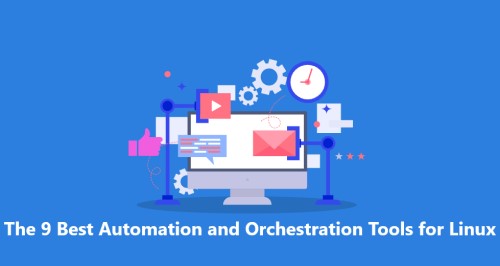Automation and orchestration tools are essential for any Linux-based system administrator. These tools enable users to automate and manage routine tasks, such as system configuration, system monitoring, software deployment, and more. Automation and orchestration tools make it easier for system administrators to manage their systems and reduce human error.
Here at Ibmi Media, we will look at the 9 best automation and orchestration tools for Linux.
Main features of open source Automation and Orchestration Tools includes:
1. Automation
The primary purpose of automation and orchestration tools is to automate a range of tasks. This includes tasks such as deploying applications, running tests, and collecting metrics. Automation tools can be used to automate any task that can be scripted, such as shell scripts, Python scripts, or other scripting languages.
2. Orchestration
Orchestration tools enable organizations to automate and coordinate tasks across multiple systems and services. This can include scheduling tasks, managing resources, and ensuring that tasks are executed in the correct order. Orchestration tools are also often used to manage complex distributed applications.
3. Infrastructure as Code
Infrastructure as code (IaC) is a powerful concept that allows organizations to define and manage their infrastructure using code. This includes servers, operating systems, databases, networking, and other components. IaC tools can be used to create, monitor, and manage cloud-based and on-premise infrastructure.
4. Containers
Containers are a great way to package and deploy applications, and many open source automation and orchestration tools provide support for containerization. Containers allow applications to be deployed and run in isolated environments, which helps to improve security and scalability.
5. Continuous Integration/Continuous Delivery
Continuous integration (CI) and continuous delivery (CD) are two related concepts that have become popular in the software industry. CI/CD tools enable organizations to automate the process of building, testing, and deploying software on a regular basis. This helps to ensure that software is always up to date and secure.
6. Monitoring
Monitoring tools are used to monitor the performance and availability of IT infrastructure and applications. These tools can be used to detect any issues or problems that may arise, as well as to collect metrics and analytics.
7. Security
Security is an important aspect of any IT infrastructure, and many open source automation and orchestration tools provide support for security-related tasks. This includes tasks such as authentication and authorization, as well as encryption and key management.
8. Scalability
Scalability is an important factor in any IT infrastructure, and many open source automation and orchestration tools provide support for scaling applications and services. This includes tasks such as scaling out applications to multiple servers, and scaling up applications to handle increased loads.
9. Logging
Logging is an important aspect of any IT infrastructure, and many open source automation and orchestration tools provide support for logging. This includes tasks such as collecting logs from different sources, parsing and analyzing logs, and forwarding logs to third-party services.
10. Reporting
Reporting is an important part of any IT infrastructure, and many open source automation and orchestration tools provide support for reporting. This includes tasks such as generating reports on completed tasks, generating performance metrics, and generating custom reports.
The 9 Best Automation and Orchestration Tools for Linux includes:
1. Ansible
Ansible is a powerful automation and orchestration tool that allows users to automate and manage their IT infrastructure. Ansible is free and open source, and it is designed to allow users to easily manage their systems, including servers, networks, and applications. It is agentless, which means it can be used to manage systems without having to install additional software. Ansible is written in Python and is easy to learn. It can be used to automate the deployment of applications, configure systems, manage software packages, Monitor system performance and Provide networks and cloud infrastructure.
Pros:
- Ansible is an open source automation tool that is easy to use, requires minimal setup and is highly secure with built-in encryption.
- It is also very powerful and extensible allowing for the automation of complex tasks.
Cons:
- Ansible is not as intuitive as some other automation tools and can be difficult to debug.
Features of Ansible:
- Ansible can be used for configuration management, application deployment, task automation, and provisioning.
- It also supports popular cloud providers like Amazon Web Services, Microsoft Azure, and Google Cloud Platform.
It's Official Website: https://docs.ansible.com/
How to Install Ansible on your Linux system ?
To install Ansible on a Linux system, you can use the apt package manager:
$ sudo apt update
$ sudo apt install ansible
2. Puppet
Puppet is an open source configuration management and orchestration tool for Linux systems. It allows users to define and manage their infrastructure as code, which makes it easier to deploy and maintain applications and services. Puppet is agent-based, which means it requires a Puppet agent to be installed on the managed systems. Puppet is written in Ruby and is easy to learn. It is used to automate the deployment of applications, configure systems, manage software packages, and more.
Pros:
- Puppet is a powerful automation tool that is well-suited for automation of complex tasks.
- It is also highly secure and extensible, allowing for custom code to be written to automate tasks.
- Cons:
- Puppet requires additional setup and can be difficult to learn, especially for beginners.
Features of Puppet:
- Puppet can be used for configuration management, application deployment, task automation, and provisioning.
- It also supports popular cloud providers like Amazon Web Services, Microsoft Azure, and Google Cloud Platform.
It's Official Website: https://puppet.com/
How to Install Puppet on your Linux system ?
To install Puppet on a Linux system, you can use the apt package manager:
$ sudo apt update
$ sudo apt install puppet
3. Chef
Chef is an open source automation and orchestration tool for Linux systems. It is a configuration management system that allows users to define and manage their infrastructure as code. Chef is agent-based, which means it requires a Chef agent to be installed on the managed systems. Chef is written in Ruby and is easy to learn. It is used to automate the deployment of applications, configure systems, manage software packages, provides networks and cloud infrastructure and Monitor system performance.
It's Official Website: https://www.chef.io/
How to Install Chef on your Linux system ?
To install Chef on a Linux system, you can use the apt package manager:
$ sudo apt update
$ sudo apt install chef
4. Salt
Salt is an open source automation and orchestration tool for Linux systems. It is a configuration management system that allows users to define and manage their infrastructure as code. Salt is agent-based, which means it requires a Salt agent to be installed on the managed systems. Salt is written in Python and is easy to learn. It is used to automate the deployment of applications, configure systems, manage software packages, and more.
It's Official Website: https://docs.saltstack.com/
How to Install Salt on your Linux system ?
To install Salt on a Linux system, you can use the apt package manager:
$ sudo apt update
$ sudo apt install salt
5. CFEngine
CFEngine is a powerful automation and orchestration tool for Linux systems. It is an agent-based system that allows users to automate the management and deployment of their infrastructure as code. CFEngine is written in C and is easy to learn. It is used to automate the deployment of applications, configure systems, manage software packages, and more.
It's Official Website: https://cfengine.com/
How to Install CFEngine on your Linux system ?
To install CFEngine on a Linux system, you can use the apt package manager:
$ sudo apt update
$ sudo apt install cfengine
6. Fabric
Fabric is an open source automation and orchestration tool for Linux systems. It is a Python-based system that allows users to automate the deployment of applications, configure systems, manage software packages, and more. Fabric is agentless, which means it can be used to manage systems without having to install additional software.
It's Official Website: http://www.fabfile.org/
How to Install Fabric on Linux systems ?
To install Fabric on a Linux system, you can use the pip package manager:
$ sudo pip install fabric
7. Docker
Docker is an open source container platform that allows users to easily deploy and manage applications. It is used to automate the deployment of applications, configure systems, manage software packages, and more. Docker is agentless, which means it can be used to manage systems without having to install additional software.
It's Official Website: https://www.docker.com/
How to Install Docker on a Linux system ?
To install Docker on a Linux system, you can use the apt package manager:
$ sudo apt update
$ sudo apt install docker
8. Jenkins
Jenkins is an open source automation server for Linux systems. It is used to automate the deployment of applications, configure systems, manage software packages, and more. Jenkins is written in Java and is easy to learn. It is agentless, which means it can be used to manage systems without having to install additional software.
It's Official Website: https://jenkins.io/
How to Install Jenkins on your Linux system ?
To install Jenkins on a Linux system, you can use the apt package manager:
$ sudo apt update
$ sudo apt install jenkins
9. Kubernetes
Kubernetes is an open source container orchestration platform for Linux systems. It is used to automate the deployment of applications, configure systems, manage software packages, and more. Kubernetes is written in Go and is easy to learn. It is agentless, which means it can be used to manage systems without having to install additional software.
It's Official Website: https://kubernetes.io/
How to Install Kubernetes on your Linux system ?
To install Kubernetes on a Linux system, you can use the apt package manager:
$ sudo apt update
$ sudo apt install kubectl
10. Capistrano
Capistrano is a powerful automation tool that is well-suited for automation of complex tasks. It is also highly secure and extensible, allowing for custom code to be written to automate tasks. It can be used for configuration management, application deployment, task automation, and provisioning. It also supports popular cloud providers like Amazon Web Services, Microsoft Azure, and Google Cloud Platform.
It's Official Website: https://capistranorb.com/
How to install Capistrano on your Linux system ?
Capistrano can be installed from the terminal using the command:
$ sudo apt install capistrano
11. Rundeck
Rundeck is a powerful automation tool that is well-suited for automation of complex tasks. It is also highly secure and extensible, allowing for custom code to be written to automate tasks. it can be used for configuration management, application deployment, task automation, and provisioning. It also supports popular cloud providers like Amazon Web Services, Microsoft Azure, and Google Cloud Platform.
It's Official Website: https://www.rundeck.com/
How to install Rundeck on your Linux system ?
Rundeck can be installed from the terminal using the command:
$ sudo apt install rundeck
[Need help in fixing Kubernetes issues ? We can help you. ]
Conclusion
This article covers the 9 best automation and orchestration tools for Linux. These tools allow users to easily automate and manage their IT infrastructure. We hope this tutorial has been helpful in helping you choose the best automation and orchestration tool for your needs.
This article covers the 9 best automation and orchestration tools for Linux. These tools allow users to easily automate and manage their IT infrastructure. We hope this tutorial has been helpful in helping you choose the best automation and orchestration tool for your needs.















